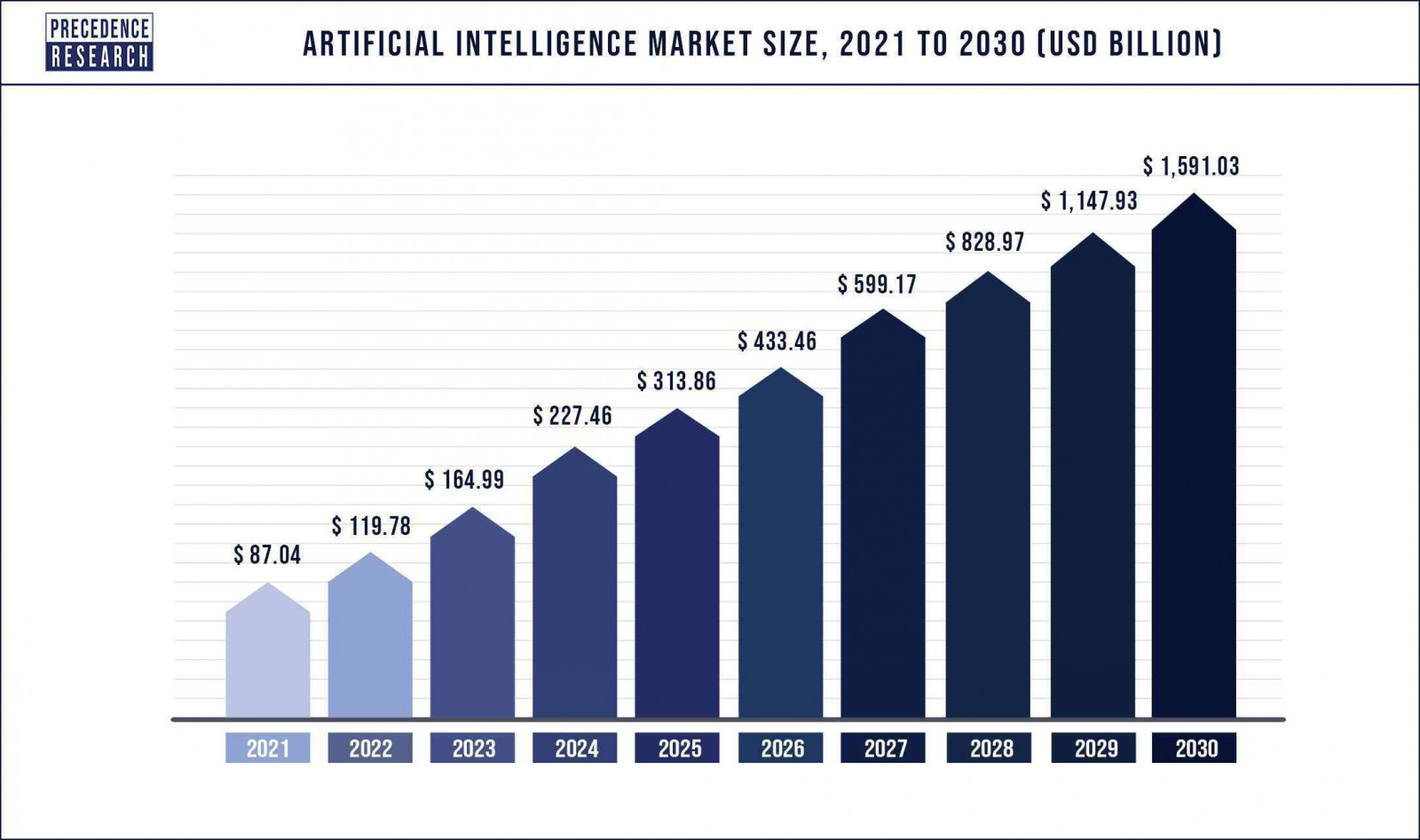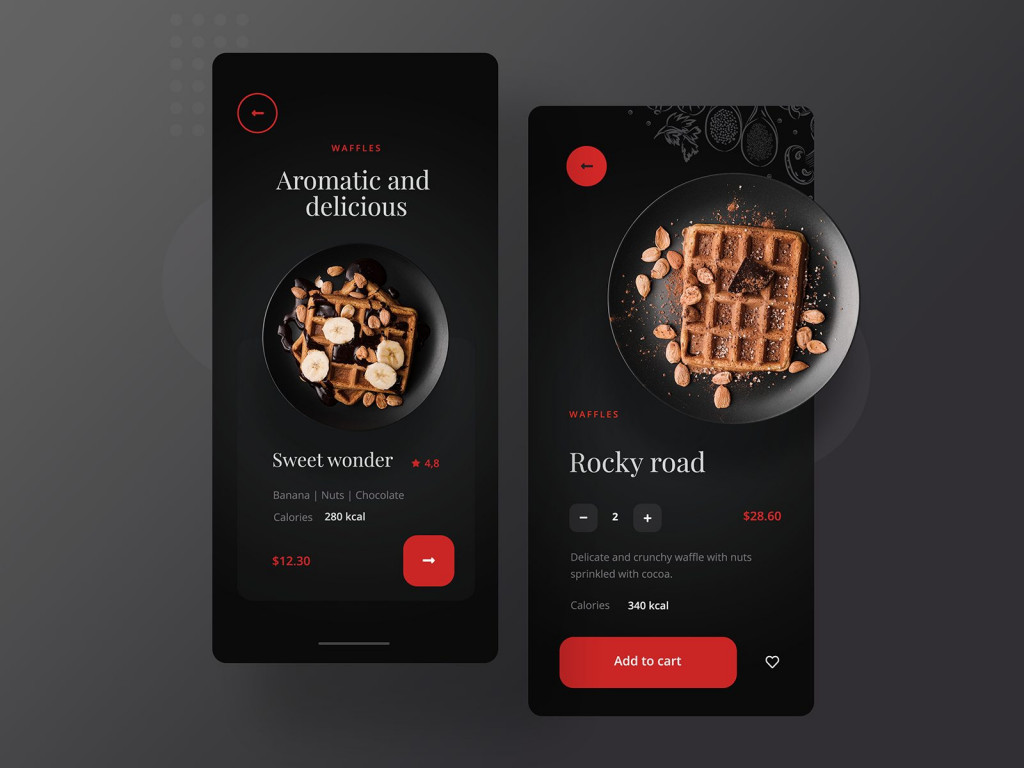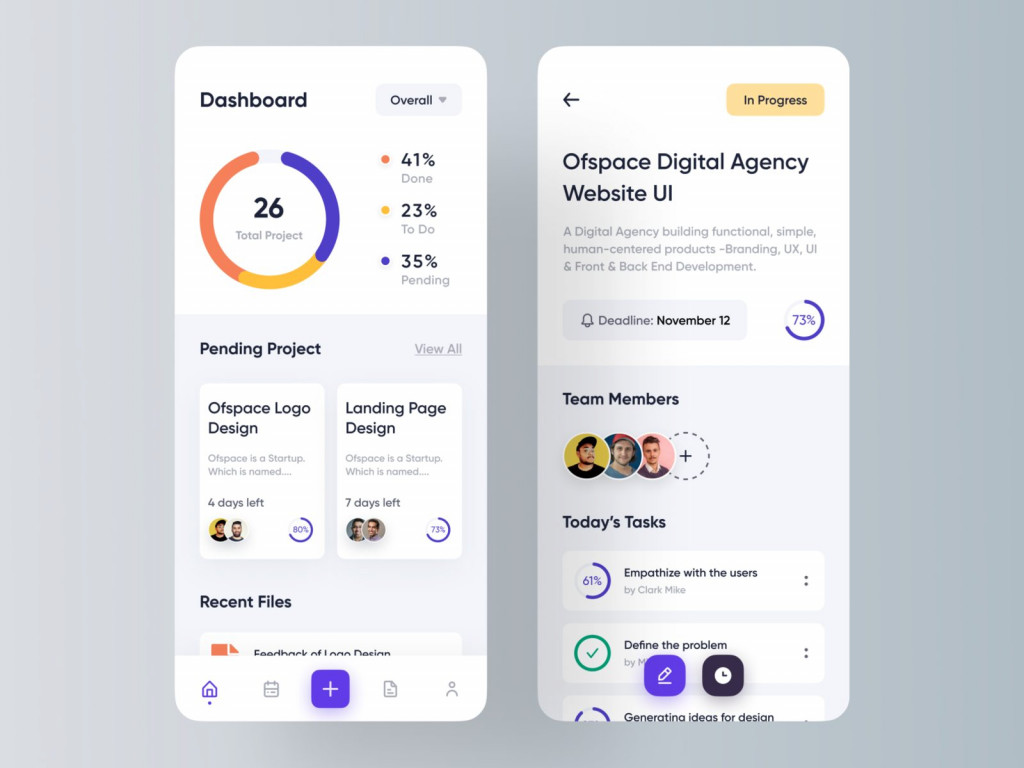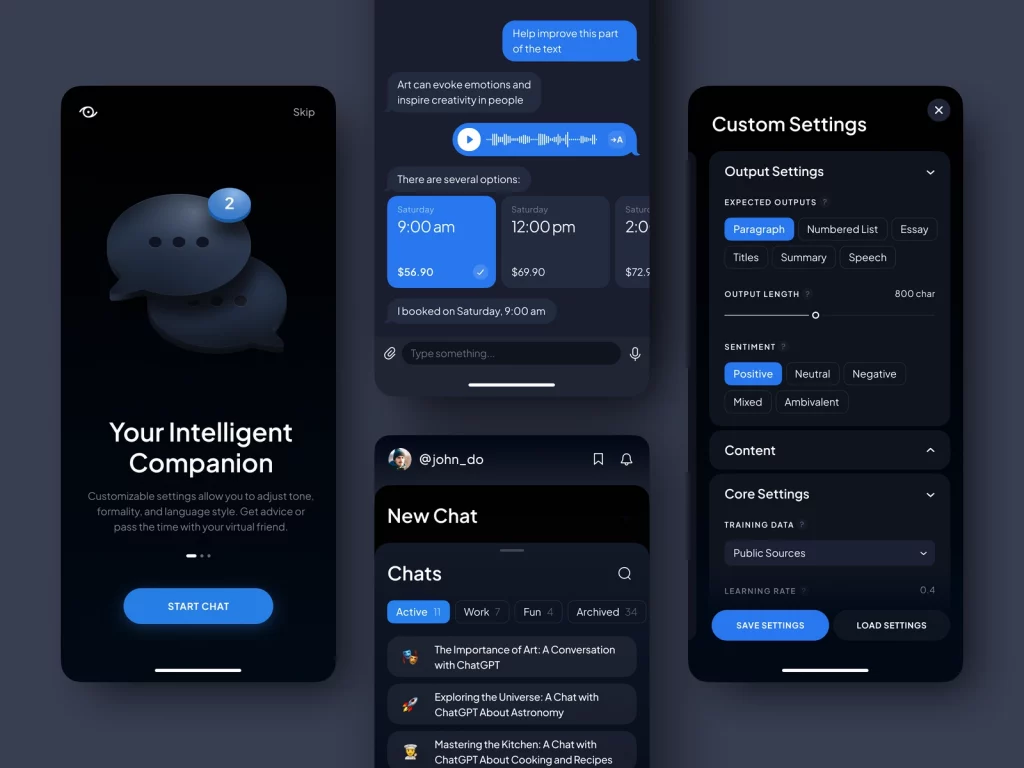Artificial intelligence (AI) has become a game-changer in various industries, and one of the areas it has impacted significantly is application development. Startups, in particular, have benefited greatly from AI, as the technology makes it easier, faster, and more affordable to create applications that meet their unique needs. In this article, we’ll explore how AI is making app development accessible for startups and how they can leverage this technology to gain a competitive edge.
Contents:
It is without a doubt that Artificial Intelligence (AI) is becoming increasingly popular in small businesses and startups. According to Precedence Research, the global AI market size was $119.78 billion in 2022 and is expected to grow at a CAGR of 38.1% from 2022 to 2030, reaching $1,597.1 billion by 2030. AI instruments are being used by small and medium-sized businesses to optimize and automate their operations. In fact, by 2030 seventy percent of businesses will have implemented some form of artificial intelligence. Businesses that do not prioritize AI in 2023 will lose plenty of ground to their digitally-oriented competitors.

How AI is revolutionizing app development for startups
Startups have always been faced with challenges such as limited resources and a lack of experience, making it difficult to develop high-quality apps. However, the rise of artificial intelligence (AI) tools has changed the way businesses approach app development. It can reduce costs, speed up development time, and produce more efficient and effective apps. Let’s explore the changes in approaches for startups and why they are more profitable than traditional approaches, as well as the tools being used.
Tedious traditional app development approaches for startups
Before the advent of AI, new business owners would have to spend a significant amount of time and money on developing their apps, hiring expensive developers, or outsourcing work to third-party companies. This process was time-consuming, inefficient, and costly, making it difficult for startups to compete in the market. Additionally, traditional development was often labor-intensive, requiring a team of developers to write complex code and test the result.
Changes in app development approaches with the advent of AI tools
With the advent of AI instruments, owners now have access to automated app development solutions that can streamline the process, reduce costs, and increase efficiency. With the assistance of AI, you can automatically generate code, test apps, and identify bugs, reducing the workload on developers and speeding up the process. Furthermore, AI-assisted applications allow startups to create more accurate and effective apps by analyzing user data and behavior.
An overview of AI app development tools being used by startups
Instruments such as natural language processing (NLP) are included in that process, as well as machine learning (ML), and chatbot frameworks. These tools allow startups to develop intelligent chatbots, language translation apps, and voice assistants with greater ease and accuracy. For example, companies like Google and IBM offer AI-powered APIs that allow developers to integrate NLP and ML capabilities into their apps. Furthermore, companies like Microsoft and Amazon offer chatbot frameworks that can be easily integrated into existing apps.
Why AI-assisted app development is more profitable for startups
Significant cost reduction, the increase in speed of development time, and more efficient and effective apps fall under the various advantages AI provides new businesses. They can now create a product that is more personalized, accurate, and user-friendly, which can lead to increased customer satisfaction and revenue. Additionally, this technology can provide insights into user behavior, allowing new businesses to optimize their product and improve their overall business strategy.
Expected changes in AI-assisted app development for startups in 2023
As AI continues to advance, we can expect the landscape of that technology to undergo significant changes in 2023. Here are the expected changes:
- Increased use of AI app development tools: startups are anticipated to embrace them, such as low-code and no-code platforms, to speed up the development process and reduce costs.
- AI-assisted automated testing: They can identify and fix bugs and vulnerabilities, allowing startups to release high-quality apps faster.
- Improved personalization: By using AI algorithms, startups can deliver personalized experiences to users based on their preferences, behavior, and context. This level of personalization can enhance the user experience, and improve retention and revenue.
- Integration of AI-powered analytics: It can provide insights into app performance, user behavior, and business metrics, leading to informed decision-making. AI-powered analytics can analyze vast amounts of data quickly and efficiently, providing valuable insights.
We can expect the industry to experience significant changes in 2023, such as the increased use of certain tools, AI-assisted automated testing, improved app personalization, and integration of AI-powered analytics.
Pros and cons of AI-assisted app development
This process is becoming increasingly popular among newcomers and established companies. While there are many benefits to using AI tools to develop applications, there are also some drawbacks to consider. Here are the advantages and disadvantages:
Pros
- Saving time and money: Can automate repetitive tasks, such as testing and debugging, which can save developers time and money.
- Improving app quality and performance: Helps developers identify and fix bugs, optimize performance, and enhance user experience.
- Accelerating the development process: Speeds up the development process by generating code, providing suggestions, and predicting outcomes.
Cons
While there are many benefits, some drawbacks can be encountered, such as:
- Lack of creativity and innovation: Assists with routine tasks automation, but they cannot replace human creativity and innovation, which are essential for developing truly unique and ground-breaking apps.
- Dependence on technology may lead to less focus on user needs: Relying too heavily on them may lead to a lack of focus on user needs and preferences, which can result in a less user-friendly interface.
- The cost of implementation may be high: Their development and implementation can be expensive, which may be a barrier for some startups and smaller companies.
It is essential to consider the pros and cons of the technology before deciding to implement it.

Waffles and Tasty – Food Mobile by Tomasz Mazurczak
Tips for integrating AI into app development as a startup
As a startup, incorporating AI into your process can help you stay ahead of the competition. AI has the power to automate processes, reduce costs, and improve user experience. However, AI integration can be challenging. Below are some tips on how to do so.
Research AI tools available
Before you start integrating AI into your process, it’s crucial to research the tools available. This will help you determine the best ones to use. Here are some things to consider when researching:
- Look for AI tools that specialize in creating applications: There are several ones available, but not all of them are created equal. Look for them to ensure that they can cater to your needs.
- Check the features: Make sure the AI tools you choose have the features that satisfy your needs. For example, some can automate the testing process, while others can help with data analysis.
- Check the pricing: Consider the cost of the AI instruments you want to use. Some can be expensive, and as a startup, you need to keep your costs low.
Familiarize yourself with the AI tools
Before integrating AI into your project, it is essential to familiarize yourself with the AI tools available. Familiarizing yourself with them will help you identify which tools will best suit your project requirements. Here are some tips for getting started:
- Research AI app development tools: Research the various ones available to understand their features and functionalities for development
- Attend webinars and events: Attend webinars and events to learn more about the latest developments and startup trends. Some blogs that can help as well.
Identify the best AI tool for your project
Once you have familiarized yourself with AI tools, the next step is to identify the best ones for you. The best AI tool for your project will depend on the nature of your app and its requirements. Here are some tips for identifying the best AI tool:
- Analyze your project requirements to understand the features and functionalities that your product needs.
- Match your project requirements with the features and functionalities offered.
- Check if the AI tool you choose is compatible with your development platform.
Examples of best AI instruments for certain app development projects:
- Chatbots and conversational interfaces: Dialogflow and IBM Watson Assistant are two popular AI tools used for developing chatbots and conversational interfaces. These tools are useful to users because they allow businesses to provide 24/7 customer support, reduce response times, and improve customer engagement. Chatbots and conversational interfaces can help businesses automate certain tasks, answer common questions, and even make suggestions based on user input. By using Dialogflow and IBM Watson Assistant, businesses can easily create and customize chatbots to meet their specific needs.
- Image and video recognition: Google Cloud Vision and Amazon Rekognition are two AI tools that enable users to analyze and categorize images and videos. These tools are useful to users because they can help businesses automate certain processes, such as tagging and organizing large collections of images or videos. They can also be used to identify objects, people, or other items in images or videos, which can be useful for security purposes, content moderation, or even marketing campaigns.
- Predictive analytics: RapidMiner and DataRobot are two AI tools that help businesses make predictions based on data. These tools are useful to users because they can help businesses identify patterns and trends in data, forecast future outcomes, and make data-driven decisions. Predictive analytics can be used in a variety of industries, such as finance, healthcare, and marketing, to help businesses make better decisions and optimize their operations.
- Voice recognition: Amazon Alexa and Google Assistant are two popular AI tools used for developing voice recognition capabilities. These tools are useful to users because they allow businesses to create voice-enabled devices and applications that can understand and respond to user commands. Voice recognition technology can be used to automate certain tasks, such as turning on lights or adjusting the temperature, and can be integrated with other AI tools, such as chatbots, to provide a more seamless user experience.
- Personalization: Adobe Target and Salesforce Einstein are two AI tools that help businesses deliver personalized experiences to their customers. These tools are useful to users because they allow businesses to analyze customer data and create targeted marketing campaigns or personalized product recommendations. Personalization can help businesses increase customer engagement, loyalty, and ultimately drive sales.
Overall, these AI tools can be incredibly useful to businesses looking to improve their operations, enhance their customer experience, and stay competitive in today’s market. By leveraging these tools, businesses can automate certain tasks, make data-driven decisions, and provide more personalized experiences to their customers.

Project Management Mobile App by Nasim
Consider the potential risks of using AI for app development
While AI has several advantages in this sector, there are also potential risks that you should consider, which include:
- Privacy and security: AI collects data, and if the data is not secure, it can result in a breach of user privacy and security.
- Bias: AI algorithms can be biased, leading to incorrect predictions or decisions.
- Dependence: Over-reliance on AI can lead to a lack of human oversight and neglect of important factors that may not be captured by the AI model. This can result in serious consequences, particularly in areas such as healthcare and finance.
Implementing AI can provide numerous benefits, such as process automation, cost optimization for startups, and improved user experience. To successfully integrate AI, it’s crucial to research and familiarize yourself with the available AI tools and identify the best tool for your project.
Conclusion
To conclude, the emergence of AI-powered application development has brought about a significant transformation in the approach that companies adopt. The utilization of AI tools has the potential to enhance the development process, minimize costs, and augment the quality and performance of applications. Nevertheless, it is important to also consider potential drawbacks such as reduced creativity and innovation and the likelihood of prioritizing technological advancements over user requirements. In light of these factors, it is imperative for new owners to carefully evaluate the advantages and disadvantages before integrating the technology into their operations.
Do you want to develop a useful and user-friendly app for your startup? Contact us and let’s create an elite product together!

